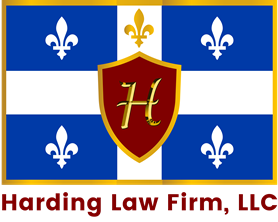Frequently Asked Questions About Family Law

Family law encompasses a variety of issues that relate to family relationships, including marriage, divorce, child custody, and more. In Georgia, individuals facing family law matters often have many questions.
The Harding Law Firm, LLC represents clients in Griffin, Georgia when they need family law support, and this guide aims to provide clarity on some frequently asked questions in this area. Read on for more information.
What Is Family Law?
Family law refers to the branch of law that deals with matters related to family relationships. This includes marriage, divorce, child custody, child support, adoption, and other related issues.
In Georgia, family law aims to resolve disputes and establish rights and responsibilities among family members. Whether dealing with divorce, custody arrangements, or adoption, having access to accurate information and reliable support is crucial.
What Are the Grounds for Divorce in Georgia?
In Georgia, there are both fault-based and no-fault grounds for divorce.
No-Fault Divorce
Most people file for divorce based on no-fault grounds. This means that neither party is required to prove wrongdoing. The primary reason cited is "the marriage is irretrievably broken."
Fault-Based Divorce
If someone chooses to file based on fault, they must provide evidence of specific actions that led to the breakdown of the marriage. Common grounds include:
Adultery
Desertion
Cruel treatment
Substance abuse
Incarceration
Choosing between these options often depends on the specific circumstances of the marriage.
How Is Property Divided in a Divorce?
Georgia follows the principle of equitable distribution when it comes to dividing marital property. This means that the court aims to divide property fairly, though not necessarily equally. Marital property includes assets acquired during the marriage, while separate property is what one spouse owned before the marriage or received as a gift or inheritance.
Factors the court may consider include:
Duration of the marriage
Contributions of each spouse to the marriage
Financial circumstances of both parties
Any misconduct, such as adultery
Understanding how property division works can help individuals prepare for negotiations and court proceedings.
What Is Child Custody?
Child custody determines how parents share responsibility for their children after separation or divorce. In Georgia, custody can be classified as legal custody and physical custody.
Legal Custody
Legal custody involves the right to make significant decisions about a child's upbringing, such as education and healthcare. Parents can share legal custody (joint legal custody) or one parent may have sole legal custody.
Physical Custody
Physical custody refers to where the child lives. Similar to legal custody, physical custody can also be joint or sole. The court typically encourages arrangements that allow children to maintain a relationship with both parents, unless circumstances suggest otherwise.
How Is Child Support Calculated in Georgia?
Child support in Georgia is determined using a specific formula that considers both parents' incomes and the amount of time each parent spends with the child. The Georgia Child Support Guidelines provide a structured approach to calculating support obligations, taking into account factors like:
Gross income of both parents
Health insurance expenses
Childcare costs
Other relevant expenses
Courts aim to meet the child's needs while balancing the financial capabilities of both parents.
What Is Visitation?
Visitation refers to the rights of a non-custodial parent to spend time with their child. In Georgia, visitation can be established as part of a custody order. If parents can’t agree on a visitation schedule, the court may step in to determine a fair arrangement. There are a few different types of visitation that may be agreed upon.
Standard visitation: This allows the non-custodial parent to spend time with the child on weekends and during holidays.
Supervised visitation: In certain cases where there are safety concerns, visitation may be supervised by a third party.
Unsupervised visitation: The non-custodial parent has the freedom to spend time with the child without supervision.
The goal is to maintain a healthy relationship between the child and both parents, where possible.
What Are Adoption Procedures in Georgia?
Adoption is a legal process that allows individuals to become the legal parents of a child. The procedures for adoption in Georgia can vary based on the type of adoption, whether it’s a stepparent adoption, private adoption, or through the state. Let’s take a quick look at the steps for adoption.
Choose the type of adoption: Determine whether the adoption will be open, closed, or semi-open.
Home study: Prospective adoptive parents usually undergo a home study, which assesses their living situation and readiness to adopt.
File an adoption petition: This legal document initiates the adoption process.
Attend a hearing: A court hearing will take place to finalize the adoption.
Obtain an adoption decree: Once the court approves, an adoption decree is issued, making the adoption official.
The process can be lengthy and may require patience and preparation.
Can I Modify Child Custody or Support Orders?
Yes, child custody and support orders can be modified in Georgia if there’s a significant change in circumstances. Common reasons for modification include:
A change in income that affects child support obligations
Changes in living arrangements, such as one parent moving
Changes in the child's needs or preferences, especially as they grow older
To initiate a modification, one must file a petition with the court, outlining the reasons for the change.
What Should I Do If I’m Facing Domestic Violence?
If someone is facing domestic violence, immediate steps should be taken to make sure everyone is safe. Victims can seek a temporary protective order (TPO) through the court. This order can provide immediate relief, including:
No contact orders
Temporary custody of children
Temporary support orders
It’s crucial to document incidents of violence and gather evidence to support the TPO request. Local shelters and organizations can also provide assistance and resources.
What Is Mediation, and Is It Required in Georgia?
Mediation is a process where a neutral third party helps couples negotiate disputes related to divorce, custody, and support. In Georgia, mediation may be required before a court hearing, particularly in custody cases. The goal is to reach an amicable agreement without needing to go to trial, and there are many benefits to mediation.
Cost-effective: Mediation can be less expensive than prolonged court battles.
Faster resolution: The mediation process is often quicker than court proceedings.
Control over outcomes: Parents can have more say in the agreements reached during mediation.
While mediation is beneficial, it's not suitable for every situation, especially when there’s a power imbalance or allegations of abuse.
How Do I Choose a Family Law Attorney?
Selecting a family law attorney can be a critical step in traversing family law matters. When looking for legal representation, consider the following:
Experience: Look for an attorney with experience in family law cases similar to yours.
Reputation: Research online reviews and testimonials to gauge the attorney's reputation.
Communication: Choose someone who communicates clearly and makes you feel comfortable discussing sensitive issues.
Fees: Understand the attorney's fee structure, including hourly rates and retainer fees.
Having the right attorney can make a significant difference in the outcome of your case.
Enlist the Support of a Reputable Attorney
Family law issues can be emotionally charged and complicated. If you live in Griffin, Georgia or throughout Spalding County, Butts County, Monroe County, Lamar County, or Henry County, call a firm that can help: The Harding Law Fir

